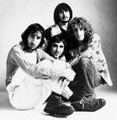Levels of language & pop group names
Analysis of the popgroup name, The Who
 Graphologically,
this pop group name is like 'The Beatles' in capitalising the head noun.
But this name is a bit more startling than 'The Beatles'. This is because
of its strong grammatical oddity. The pronoun 'who' normally refers back
in the text it occurs in to some person or group of people who have already
been identified and referred to by an appropriate noun phrase (e.g. 'The
mayor of Lancaster, who tripped over my foot last night, will not
be undertaking mayoral duties for the next week'). This pop group's noun
phrase is thus grammatically odd because the pronoun 'who' cannot normally
act as the headword in a noun phrase. Graphologically,
this pop group name is like 'The Beatles' in capitalising the head noun.
But this name is a bit more startling than 'The Beatles'. This is because
of its strong grammatical oddity. The pronoun 'who' normally refers back
in the text it occurs in to some person or group of people who have already
been identified and referred to by an appropriate noun phrase (e.g. 'The
mayor of Lancaster, who tripped over my foot last night, will not
be undertaking mayoral duties for the next week'). This pop group's noun
phrase is thus grammatically odd because the pronoun 'who' cannot normally
act as the headword in a noun phrase.
However, there is one speech situation where the noun phrase 'the who'
might occur reasonably regularly, namely as an echo question in relation
to a previous reference which the second speaker has not heard properly,
or is surprised by. Compare:
A. I just saw the [unclear words].
B. The who?
A. The Stephensons.
and:
A. I love the Beatles.
B. The who?
A. The Beatles.
B. But they are so old fashioned. If you say you love the Beatles everyone
will laugh at you.
This echo question possibility helps explain part of the effect of the
name 'The Who', which turns out to be appropriate for them. They were
a pop group who set out to surprise and alarm people with their outrageous
behaviour (for example, their leader, Pete Townshend, was the first well-known
guitarist to smash his guitars on stage). The echo-question construal
thus mimics a predicted response to them by someone who does not know
them or is outraged by them. This suggests by inference that they will
be ignored or disliked by some people (particularly older, more conventional,
members of society), which in turn reinforces group solidarity with their
admirers (who were typically young and rebellious).
|

